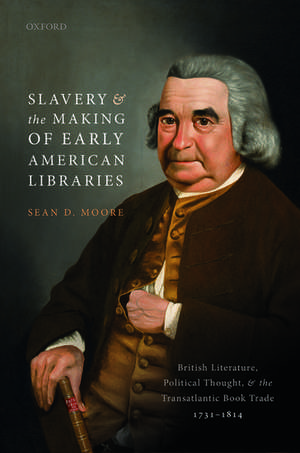Slavery and the Making of Early American Libraries: British Literature, Political Thought, and the Transatlantic Book Trade, 1731-1814
Autor Sean D. Mooreen Limba Engleză Hardback – 5 mar 2019
Preț: 523.66 lei
Preț vechi: 647.35 lei
-19% Nou
Puncte Express: 785
Preț estimativ în valută:
100.22€ • 104.24$ • 82.73£
100.22€ • 104.24$ • 82.73£
Carte tipărită la comandă
Livrare economică 04-10 aprilie
Preluare comenzi: 021 569.72.76
Specificații
ISBN-13: 9780198836377
ISBN-10: 0198836376
Pagini: 284
Ilustrații: 21 halftones
Dimensiuni: 164 x 241 x 23 mm
Greutate: 0.59 kg
Editura: OUP OXFORD
Colecția OUP Oxford
Locul publicării:Oxford, United Kingdom
ISBN-10: 0198836376
Pagini: 284
Ilustrații: 21 halftones
Dimensiuni: 164 x 241 x 23 mm
Greutate: 0.59 kg
Editura: OUP OXFORD
Colecția OUP Oxford
Locul publicării:Oxford, United Kingdom
Recenzii
The power of this overall argument owes its success, as much as anything, to the effectiveness of the book's structure. Each of the book's five chapters has a dual focus: first, on the history of one of the major pre-Revolutionary libraries in the North American colonies, and second, on a particular literary text circulating among that library's members that illuminates a particular community of readers in a unique way.
Slavery and the Making of Early American Libraries will be of interest to scholars eager to learn more about the specific institutions Moore has studied as well as the reading lists of their members... I hope future historians will pick up the important work that Moore has started and draw connections between the books in these libraries and the actions of the men who supported them.
...powerful and indignant... brave and passionate...
Moore's readings are well-considered and compelling, acquiring considerable force both in themselves and through their contexts...That Slavery and the Making of Early American Libraries suggests diverse further angles of inquiry is a testament to the interest and power of what it accomplishes. It provides convincing proofs of its thesis, fruitful readings of its chosen texts, rich seams of fascinating evidence, and an important challenge to its readers, demanding that we recognize ugly truths about the fiscal and ideological underpinnings of early institutional culture.
Slavery and the Making of Early American Libraries will be of interest to scholars eager to learn more about the specific institutions Moore has studied as well as the reading lists of their members... I hope future historians will pick up the important work that Moore has started and draw connections between the books in these libraries and the actions of the men who supported them.
...powerful and indignant... brave and passionate...
Moore's readings are well-considered and compelling, acquiring considerable force both in themselves and through their contexts...That Slavery and the Making of Early American Libraries suggests diverse further angles of inquiry is a testament to the interest and power of what it accomplishes. It provides convincing proofs of its thesis, fruitful readings of its chosen texts, rich seams of fascinating evidence, and an important challenge to its readers, demanding that we recognize ugly truths about the fiscal and ideological underpinnings of early institutional culture.
Notă biografică
Sean Moore is the Editor of the international journal Eighteenth-Century Studies. He is the author of Swift, the Book, and the Irish Financial Revolution: Satire and Sovereignty in Colonial Ireland (Johns Hopkins UP, 2010), which won the Murphy Prize for Distinguished First Book from the American Conference for Irish Studies (ACIS). He has published in PMLA, The Eighteenth Century: Theory and Interpretation, Atlantic Studies, the Journal of Commonwealth and Postcolonial Studies, and other journals and essay collections. He was a Fulbright Scholar to Ireland as a graduate student, and has held fellowships from the National Endowment for the Humanities (NEH), American Antiquarian Society (AAS), Library Company of Philadelphia, Folger Library, John Carter Brown Library, Newport Mansions, and other institutions.
